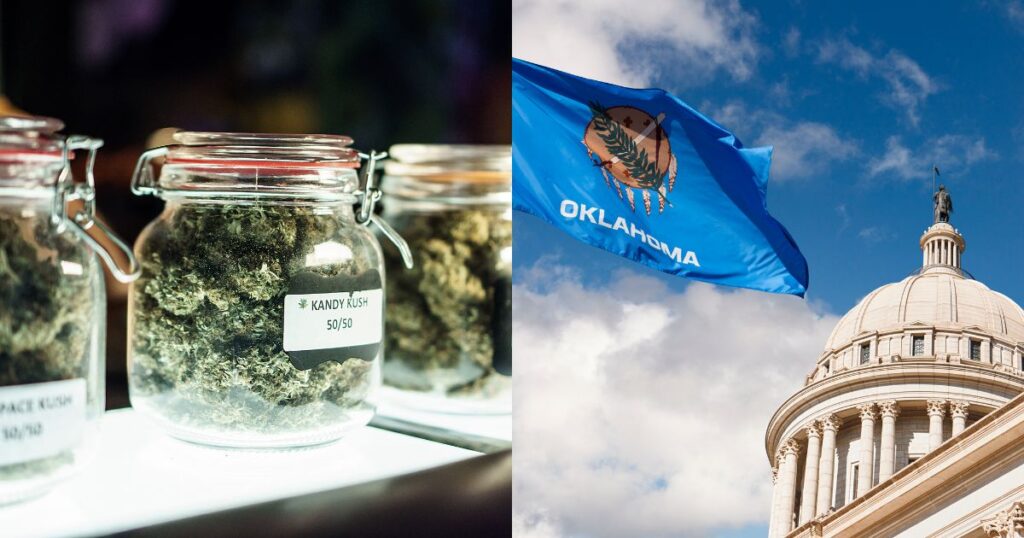The push to legalize recreational cannabis for adults is once again gaining momentum in Oklahoma. Activists are hitting the streets, driven by the goal of placing State Question 837 on the ballot. For this effort to succeed, they need a massive number of signatures from registered voters across the state.
This initiative is more than just a change in law; it’s an opportunity for Oklahoma to establish a regulated cannabis market that reflects the will of its citizens and modernizes its approach to marijuana.
What is State Question 837?
State Question 837, also known as the Marijuana Legalization Initiative, is a proposed constitutional amendment that would legalize the purchase, possession, and consumption of marijuana for adults aged 21 and older. Spearheaded by Oklahomans for Responsible Cannabis Action, the initiative aims to create a safe, regulated market for recreational cannabis.
If passed, SQ 837 would introduce several significant changes:
- Personal Use and Cultivation: Adults could legally possess specified amounts of cannabis, including up to 12 personal marijuana plants for home cultivation.
- Tax Structure: The existing 7% tax on medical marijuana would be eliminated. A new 10% excise tax would be applied to recreational marijuana sales, with revenue distributed among state, county, and municipal governments based on where the sales occur.
- Personal Protections: The amendment would establish a right to privacy for cannabis use, preventing individuals from being denied housing or employment based on their legal consumption.
- Business Licensing: Existing medical marijuana business licenses would transition to general “Marijuana Business Licenses,” allowing them to serve both the medical and recreational markets.
The initiative seeks to build upon the state’s existing medical marijuana framework, creating a comprehensive system that serves all adult Oklahomans.
Race for Signatures
To get State Question 837 on the ballot, supporters must collect 172,993 valid signatures from registered Oklahoma voters. The signature gathering period began on August 6, 2025, and organizers are facing a tight deadline.
All signed petitions must be submitted by November 3, 2025. This gives advocates a 90-day window to rally support across the state. Jed Green, leader of Oklahomans for Responsible Cannabis Action, confirmed that supporters have already collected tens of thousands of signatures and distributed petitions to over 500 locations. Organizers expect a final push in the last week of October as they work to gather every possible signature before the deadline.
“We have a lot of high-functioning overachievers in our industry, and they’re knocking it out, and we also have a lot of slackers in our industry. That’s just how cannabis rolls. So, we’ll find out here, along with a lot of other folks, exactly how we did,” Green said via KOCO News.
Addressing the Opposition
Like any significant policy change, SQ 837 has faced opposition. Groups like the Oklahoma Association of Chiefs of Police have raised concerns, arguing that legalization would endanger public safety, increase youth access, and lead to more impaired driving incidents. They also suggest it could expand illegal cartel activity and erode an employer’s right to maintain a drug-free workplace.
While these concerns are worth discussing, they often overlook the experiences of the nearly half of U.S. states that have already successfully implemented recreational cannabis programs. In states like Colorado, Washington, and California, the dire predictions of prohibitionists have not materialized.
Instead, these states have generated billions in tax revenue, which funds public services like schools, infrastructure, and addiction treatment. They have also created regulated systems that prioritize safety, with strict rules on packaging, testing, and marketing to prevent youth access.
Furthermore, a legal market helps to dismantle the illicit trade by providing consumers with safe, tested products. Data from other states has not shown a significant, sustained increase in impaired driving fatalities directly attributable to legalization.
Legalization also allows for better public education on responsible consumption. By establishing a regulated framework, Oklahoma can control the cannabis market, ensure product safety, and direct tax revenue toward community betterment rather than allowing profits to flow to an unregulated underground market.
Path Forward For State Question 837 and Recreational Cannabis in Oklahoma
The success of State Question 837 hinges on the active participation of Oklahoma voters. With the November 3rd deadline approaching, every signature counts.
This initiative offers a chance to create a responsible, regulated cannabis market that aligns with the growing acceptance of marijuana across the nation. By learning from other states, Oklahoma can implement a system that generates revenue, protects public health, and respects personal freedoms.
The next few weeks will be crucial. For those who support this change, the time to act is now. Find a petition, add your signature, and help shape the future of cannabis in Oklahoma.




















